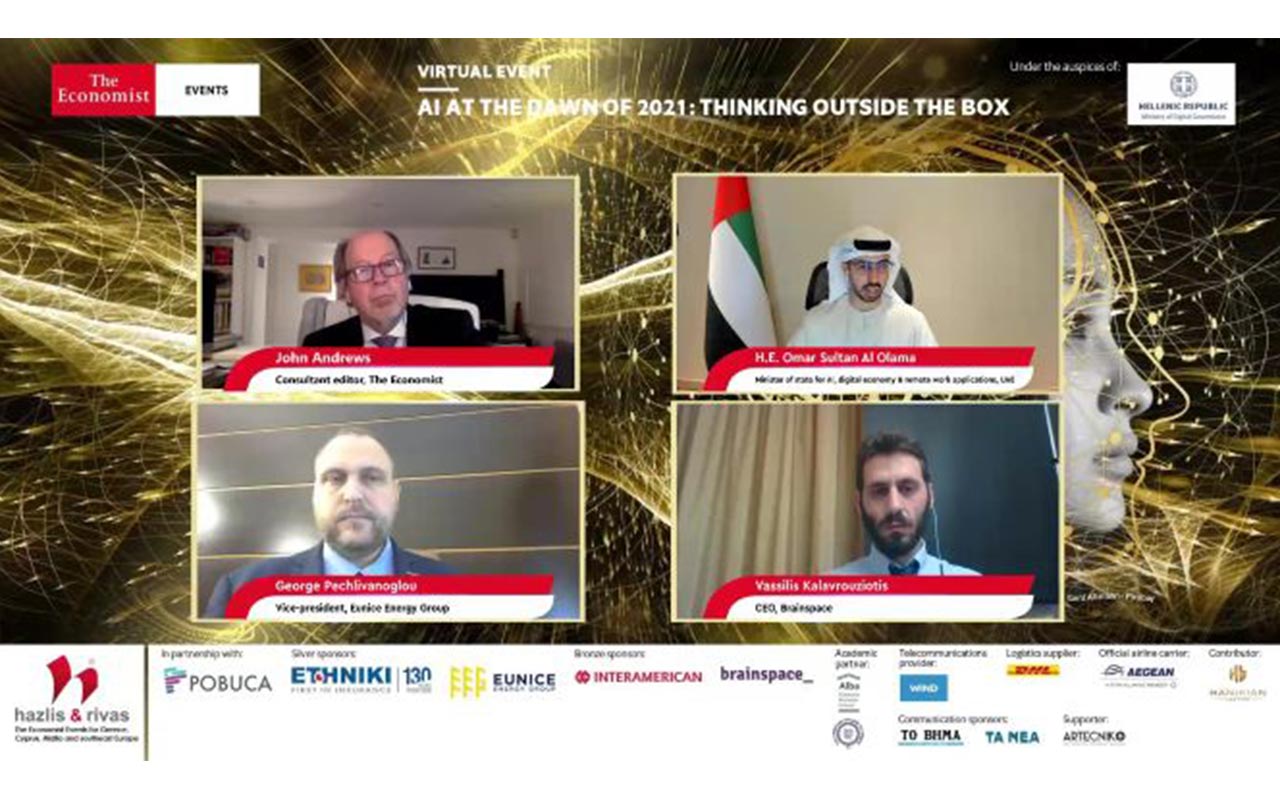AI applications in the energy field – spearheaded by ‛Aftonomo’, with S4S in the island of Tilos as a starting point.
The new initiatives and synergies for the development and application of artificial intelligence in the field of energy, undertaken and implemented by the EUNICE ENERGY GROUP (EEG) – spearheaded by the new ‛Aftonomo’ system for businesses and residences, and with the internationally acclaimed, innovative smart energy management system S4S that was implemented in the island of Tilos as its starting point – were presented at the Economist conference “AI AT THE DAWN OF 2021: THINKING OUTSIDE THE BOX” that was held online on Friday, January 29, 2021.
The EUNICE ENERGY GROUP (EEG) was represented at the conference by Giorgos Pechlivanoglou, Executive Director of the Group; technology company brainspace was also present, represented by CEO Mr. Vasilis Kalavrouziotis.
At the conference, it was announced that brainspace is developing and implementing artificial intelligence techniques in combination with RES technologies and other ICT, IoT and Blockchain technologies for the collection of energy production and consumption data from smart domestic devices and sensors, and decision-making based on this data. In this way, RES use can be maximized, paving the way for a better, energy sustainable future.
Over recent years, the EUNICE ENERGY GROUP (EEG) has made significant investments in the development of cutting-edge technologies. Taking technologies for the ‛Aftonomo’ program and the S4S as its starting point, it now undertakes new initiatives and synergies for the development and application of artificial intelligence in the field of energy.
Brainspace cooperates with the Greek EUNICE ENERGY GROUP (EEG) for the new ‛Aftonomo by EEG’ system that combines RES systems with smart meters, smart sockets, relays and software for complete control and management of energy, with the aim to achieve energy autonomy and independence in homes, businesses and industries. At the same time, ‛WeAftonomo’, the new financing program offered by WE ENERGY to existing and new customers, is already in place, enabling them to make their homes or businesses energy autonomous.
The innovative S4S and ‛Aftonomo’ systems for energy independence and autonomy combine various renewable energy sources with storage and utilize data and information from environmental measurement sensors as well as historical production, storage and operation data to ensure uninterrupted power supply, even in remote areas, offering users energy autonomy and independence.
The next steps in the evolution of such energy autonomy systems include the adoption of artificial intelligence techniques in combination with big data analytics.
“We believe that the future of energy systems is inextricably linked to the development of artificial intelligence algorithms, that will eventually be called upon to operate the smart grids of the future,” G. Pechlivanoglou said in his presentation.
Referring to the importance of artificial intelligence in green energy, Mr. V. Kalavrouziotis, CEO of brainspace, stressed that this development is a huge step forward in the evolution of humanity and that the use of AI is a one-way street for a sustainable future. As he said: “Artificial intelligence is the very basis that will support the digital transformation of many sectors, and not just businesses. For example in the fields of medicine, tourism, industry, and – of course – energy, technological advances and automation of processes and systems create new innovations and products that improve people’s daily lives. Artificial intelligence will revolutionize the energy industry and allow energy market players to use machine learning in order to improve their predictive capabilities, to increase transparency in the energy trade, to fully and efficiently manage smart grids and, most importantly, to control and fully manage energy storage.
Artificial intelligence can be applied:
– in energy trade
– to balance supply and demand
– for smart energy consumption
– in smart energy management and energy storage
– in smart grids
– in IoT applications
– for energy forecasts”. He stressed that “by utilizing energy management to maximum levels, every industry can contribute to better energy conservation and more efficient implementation without creating waste and pollutants”.
The conference focused on artificial intelligence (AI) and the advantages, benefits, and ethical dilemmas that can arise from its application in various areas of everyday life, especially now that humanity is fighting against the pandemic. Answering key questions, such as how AI is changing the way we work in the professional sector, how it works in the health sector, and how AI solutions can help in economic recovery, the conference also included a large section on the application of artificial intelligence in matters of environment and green development.
Watch the video of the presentation by Mr. G. Pechlivanoglou and Mr. V. Kalavrouziotis in the section of the conference on “Do we need AI for a sustainable future? ” below:
You can watch the Economist conference HERE




